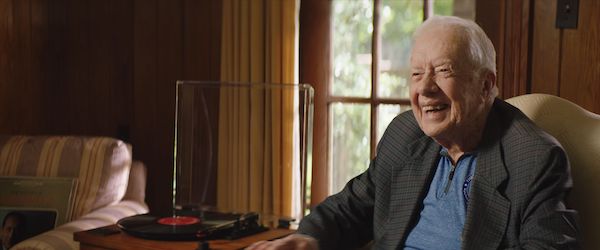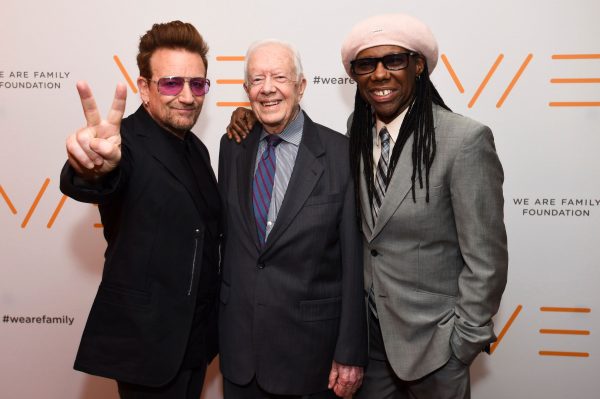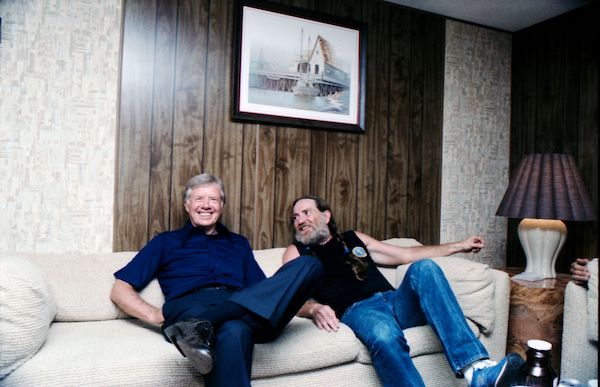Film Review and Interview: Bill Flanagan on Jimmy Carter — Rock & Roll President
By Tim Jackson
After the misery, cynicism, and division of the past four years, Jimmy Carter: Rock & Roll President is a breath of fresh air.
Jimmy Carter: Rock & Roll President, directed by Mary Wharton. Screening at the Kendall Square Cinema.

Jimmy Carter in Jimmy Carter: Rock & Roll President.
The most surprising revelation, after being told that Jimmy Carter was a “rock & roll president,” is to realize that so few know that he was a lover of American popular music, a true aficionado. Jimmy Carter: Rock & Roll President is more than just a record of Carter’s knowledge of our musical history. This lively documentary explores his belief that American music reflects the country’s soul: “I think music is the best proof that people have one thing in common no matter where they live, no matter what language they speak.” Director Mary Wharton, in collaboration with writer Bill Flanagan, help make Carter’s case by weaving together interviews with entertaining, at times inspiring, archival and concert footage. The film will make you nostalgic for great music and for a return to enlightened leadership. The Man from Plains was not a mere peanut farmer who stumbled into the country’s highest office; he was a principled leader whose spiritual beliefs and Southern roots brought youthful passion and moral direction to the presidency. After the misery, cynicism, and division of the past four years, Jimmy Carter: Rock & Roll President is a breath of fresh air.
The 1979 Iranian hostage crisis helped end Carter’s chances for reelection. Reagan won by a landslide and went on to undermine many of his predecessor’s policies. The hostages were released on the day Reagan was inaugurated as Carter boarded his plane to depart Washington. But Carter’s term should not be defined by its ending. His politics were informed by his faith and respect for human dignity. As Carter points out, “No bombs were dropped and no shots were fired” when he was president. The music that he loved, respected, and about which he knew so much, reflects that humane sensibility. He was the first of his (family) generation to attend college. He studied science and engineering and then went on to to serve as governor of Georgia.
Carter regularly attended and sang in Black gospel churches, an experience that deeply affected his worldview. “When we had no money at all, Dad had the biggest stereo in Georgia,” recalls his son Chip. As governor, he installed Martin Luther King’s portrait in the Georgia State House. Equality and opportunity for all races was in his bones. Carter became a figurehead for the “New South,” southerners who went to Ivy League schools and then returned home.
Those Southern roots, combined with a knowledge of jazz (“Our great American art form”), country, folk, and rock & roll were an essential part of his character. Concert footage and testimonial interviews, along with the words of a diverse array of artists, attest to the significance and influence that popular music exerted on Carter’s imagination. Willie Nelson and Niles Rodgers read his poetry. Carter was an admirer of Bob Dylan, who sits for an interview: “It’s impossible to define Jimmy. He’s a simple kind of man,” says Dylan, who goes on to quote the Lynyrd Skynyrd song, “Simple Man”: “Takes his time, don’t live too fast. Troubles come and they will pass. Find a woman and you’ll find love. But don’t forget son, there is someone up above.”
An Allman Brothers presidential fundraiser first clued most Americans into Carter’s musical affiliations. That relationship brought him a new young audience. He maintained friendships with musical legends of all stripes while hosting regular concerts at the White House. At one point, he is thrilled to sit in with trumpeter Dizzy Gillespie and sing the refrain to a jazz classic, “Salt peanuts, Salt peanuts.” Jimmy Buffet, the Marshall Tucker Band, Paul Simon, Chuck Leavell, Bono, Rosanne Cash, Garth Brooks, Greg Allman, and others offer praise. Garth Brooks and Trisha Yearwood are working with Carter today, through his Habitats for Humanity organization, and testify to his enormous dedication and energy at age 96. Madeleine Albright assesses his political accomplishments and lifelong commitment to basic human values. But it is Willie Nelson with whom Carter has the closest friendship. Nelson performed at the 2002 Nobel Peace Prize ceremony, an award Carter received for, among other things, “his decades of untiring effort to find peaceful solutions to international conflicts.” Nelson sings the song “Georgia on My Mind” as Carter beams and sings in the wings. Then, holding back tears, the former president thanks the person who arranged his music concerts, founded the Carter Center, and who has stood by his side for 74 years — his wife, Rosalynn Carter.
Summing up his love of music, Carter says: “In the future I think with music we’ll recognize that some of our religious beliefs — belief in the truth, belief in helping others, and our faith in democracy and freedom — those are the kinds of things that are similar to music that we can share and will eventually bring us together even in this divisive era of our constant changing history.” He breaks into a wry grin. Amen to all that.
INTERVIEW WITH BILL FLANAGAN
Following a screening at the AFI Virtual Film Festival, I spoke with writer Bill Flanagan, who collaborated with Mary Wharton and producer Chris Farrell to make the documentary.
Flanagan: Chris Farrell, the producer, and Mary Wharton, the director, came to me in the fall of 2017. Mary and I had done a lot of projects together. Chris and Mary had been exploring doing a documentary on the Allman Brothers Band. They realized that the story would be more interesting if the Allmans became part of a Jimmy Carter film rather than have Jimmy Carter be part of an Allman Brothers film. Chris made contact with the folks at the Carter Center. My first reaction was “Oh, you mean like the Allman Brothers and running the campaign and Hunter Thompson and Dylan and all that?” And they said “Yeah – and by the way nobody knows that, which is why we are talking to you. In fact, people in politics don’t know that whole story.”
Arts Fuse: Bob Dylan doesn’t do many interviews. How did that come about?
Flanagan: I’ve interviewed him before. Willie and Carter and Dylan are all still friends. It’s ongoing. I went to an event a couple of years ago where Dylan got an award from the Grammys and Carter came out and gave the speech. I met Carter at one point with REM. So he remains a big music fan, very connected to music. We wanted to get Willie Nelson sitting on the front porch, just hanging out with Jimmy.
AF: It’s a revelation that Carter has such musical knowledge.
Flanagan: It’s tremendous. We didn’t even have room for a whole section on classical music, of which he was incredibly knowledgeable. He brought classical musicians to the White House. He can spot a wrong note in a blizzard of performances. Everybody’s pretty amazed. Carter is an amazing guy intellectually. He seems to be a genius in every direction. He’s very, very competent, so when he talks to musicians he’s not bluffing. He knows what he’s talking about.

Bono and Nile Rodgers with Jimmy Carter in a scene in Jimmy Carter: Rock & Roll President.
AF: When were the interviews done and was there any intention to bring current politics into the story?
Flanagan: We did most of the interviews in 2018. It wasn’t particularly a repudiation of Trump or anything. We thought everything can’t be about Donald Trump. But of course it is a good reminder that there was a time when decent intellectual progressive figures could rise to the top. Although it should be asked whether Carter could have been elected at any other moment. That is an open question. We were coming out of Watergate and out of the Nixon resignation. The country was looking for something different. I don’t know if four years earlier or four years later he could have made it all the way through.
I always remember the first debate, which I think was in New Hampshire in ’76. There were seven guys who all looked like they were trying to be JFK and then there was this very different character – a Southern born-again liberal. He stood out. And, strangely enough, I flashed back to that during Trump’s first debate with the Republicans. There are six guys who look like they came out of the same mold and then there’s this weird character who is drawing all the energy to himself.
AF: What was your hand in structuring the film?
Flanagan: It was very collaborative, but ultimately it is Mary’s story. I did the interviews except for Willie because of scheduling conflicts. I knew the story and I knew the musicians. My role was selecting the subjects that we were going to cover and then stepping back and letting Mary decide what film to make. You could have made any number of movies out of the stuff we shot. There could have been a film made about things like Elvis Presley calling the White House at all hours trying to get Carter to help his various friends who had been arrested for drunk driving – or Carter doing things post-presidency with Michael Jackson and how kooky Michael was. There are tons of things like that. But Mary’s vision was to stay focused on one story. She was more interested in the drama of it. I might’ve gone a little more towards the “get a load of this“ side of it.
AF: What were the plans for the film before Covid struck?
Flanagan: Well, that is one of the big disappointments. It was supposed to open the Tribeca film Festival and then Covid came. It was going to be a big event at the Beacon Theater. Carter was going to come and we had a lot of musicians who were going to perform.
AF: How do you see the film playing into Carter’s legacy?
Flanagan: Well, it’s been 45 years. People forget or they don’t know. It was probably 25 years after Harry Truman left office that the public became interested in revisiting his presidency. We forget because we are older that some people just don’t know anything about Jimmy Carter. They don’t know if he’s alive or when he was president — I mean younger people, people who are 25 and under.
Pretty much all of Carter’s aides told me the same thing – the worst thing you could do was to tell Carter that something was good for him politically. He would do the opposite. He is a very moral man. He has a strict religious code, a strict Christian code, and he teaches Sunday school. He really lives up to it. He is righteous.
AF: And he knows the lyrics to all the songs.
Flanagan: He knows all the lyrics to the songs. He can converse about them with great authority and comfort. I love that in the film Willie says, “Jimmy Carter and I get along because we come from the same place.” Carter gets along with Bob (Dylan) because they’re from completely opposite perspectives.

Jimmy Carter, left, and Willie Nelson, as seen in the documentary Jimmy Carter: Rock & Roll President.
AF: Of course, they’re all poets.
Flanagan: Well — they are all poets. In fact, I was doing the interview with Dylan and I showed him a volume of Carter’s poetry, which he reads from in the film. Dylan was really interested and commenting on the power of some of the poems. We wanted to show that Carter is something of a creative artist, too. That is something these artists relate to. He’s a versifier.
AF: Were there any interviews you left out?
Flanagan: The only interview that is completely left out was Joan Baez. We just caught her at the end of a long day and it was the same day that we did Andrew Young. When she finally got the chance she just didn’t have the energy. And probably my questions weren’t that specific. She had some interesting things to say about the Boat People. But that was an issue we didn’t have time to engage in.
AF: Such an honor to interview Jimmy Carter. Any further insight into his character?
Flanagan: Carter never goes on automatic pilot. He really thinks about things. At one point he was talking about Elvis and about Michael Jackson. You know all these guys, I said — what makes Jackson and Presley different from Dylan and Nelson? And he said, “Willie and Bob know who they are.“ That’s a very profound answer in very few words.
AF: I was wondering – where is Amy Carter?
Flanagan: We felt Chip (Carter) represented the family pretty well. Amy wants to lead a private life. Chip is a very interesting person because, number one, he was an adult when all this was going on. And two, as he says in the film, it’s intimidating to have a father who is not only a president and a naval officer and a scientist, but he can also shoot more ducks than anybody else and catch more fish than anybody else. Chip shows real humanity and I was very grateful for it. He put things into perspective, such as talking about the abuse he took for being a child of liberals in the deep South. It was hard.
AF: Rosalynn Carter appears — she is so calm and soft-spoken.
Flanagan: Definitely. I met her and we shook hands but she said she stopped doing film interviews when she turned 90.
Tim Jackson was an assistant professor of Digital Film and Video for 20 years. His music career in Boston began in the 1970s and includes some 20 groups, recordings, national and international tours, and contributions to film soundtracks. He studied theater and English as an undergraduate, and has also has worked helter skelter as an actor and member of SAG and AFTRA since the 1980s. He has directed three feature documentaries: Chaos and Order: Making American Theater about the American Repertory Theater; Radical Jesters, which profiles the practices of 11 interventionist artists and agit-prop performance groups; When Things Go Wrong: The Robin Lane Story, and the short film The American Gurner. He is a member of the Boston Society of Film Critics. You can read more of his work on his blog.
Tagged: Bill Flanagan, Jimmy Carter, Jimmy Carter: Rock and Roll President
